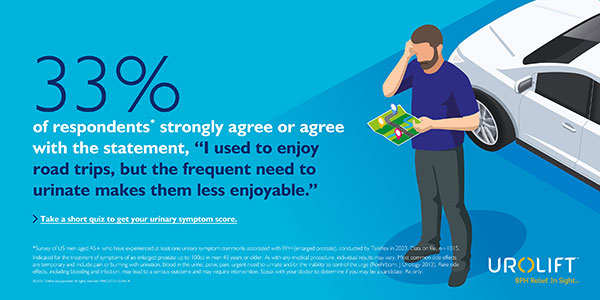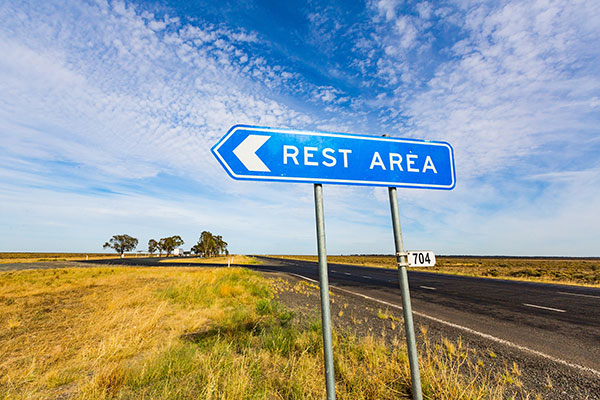(Family Features) Taking a road trip is an enjoyable pastime for many. However, if you are making too many pit stops along the way, it might be time to talk to a doctor.
Men over the age of 45 who frequently experience urinary symptoms may be facing challenges that extend beyond the restroom.
Urinary symptoms such as a frequent or urgent need to urinate may be indicators of an enlarged prostate, commonly known as benign prostatic hyperplasia (BPH).1,2 BPH symptoms can contribute to interrupted sleep, reduced productivity and feelings of depression.3 BPH affects 42 million men in the United States,4 including more than 40% of men in their 50s.
Delaying travel due to restroom access may be more common than you think. In fact, Teleflex, maker of the UroLift™ System, conducted a survey of approximately 1,000 men in the United States ages 45 and older, all of whom have experienced at least one urinary symptom associated with BPH.5
Consider these findings:

Photo courtesy of Adobe Stock
Men are bothered by having to stop while traveling. Among respondents, 41% reported they have to stop to urinate more than they would like during road trips, and 15% shared they can only travel for an hour or less before having to stop to urinate.

The frequent need to urinate impacts enjoyment of road trips. Among the men surveyed, 33% strongly agreed or agreed they “used to enjoy road trips, but the frequent need to urinate makes them less enjoyable.”

Photo courtesy of Adobe Stock
Some men choose routes based on public restroom availability. Nearly one-quarter (23%) of men responded they “usually” or “always” choose certain routes on road trips due to more or better bathroom facilities.
Men experiencing urinary symptoms should consider contacting a urologist. If left untreated, BPH can lead to permanent bladder damage.6 Medications are often prescribed for BPH, but they may cause unwanted side effects.7-8
Consider the UroLift™ System, a unique treatment for an enlarged prostate with more than 450,000 men treated worldwide.9 The minimally invasive procedure lifts and holds enlarged prostate tissue out of the way to unblock the urethra. It does not require heating, cutting or destruction of prostate tissue, and it provides rapid symptom relief and recovery.10-11 It has a low rate of complications12 and is the only leading BPH procedure shown not to cause sexual dysfunction.13-15
To learn more about treatment options, contact your doctor and visit UroLift.com.
Indicated for the treatment of symptoms of an enlarged prostate up to 100 cubic centimeters in men 45 years or older. Most common side effects are temporary and can include discomfort when urinating, urgency, inability to control the urge, pelvic pain and some blood in the urine.1 Rare side effects, including bleeding and infection, may lead to a serious outcome and may require intervention. Speak with your doctor to determine if you may be a candidate.
1 Rosenberg, Int J Clin Pract 2007
2 Vuichoud, Can J Urol 2015
3 Speakman, BJUI 2014
4 U.S. 2022 estimates based on US Market Model 2022-24 (5-17-22 FINAL), data on file.
5 Survey conducted by Teleflex in 2023. Data on file, n=1,015.
6 Tubaro, Drugs Aging 2003
7 Lusty, J Urol 2021
8 Bortnick, Rev Urol 2019
9 Management estimate based on product sales as of September 2023. Data on file Teleflex Interventional Urology.
10 Roehrborn, J Urology 2013
11 Shore, Can J Urol 2014
12 Roehrborn, Can J Urol 2017
13 AUA BPH Guidelines 2003, 2020
14 McVary, Urology 2019
15 No instances of new, sustained erectile or ejaculatory dysfunction in the L.I.F.T. pivotal study
MAC02797-01 Rev A